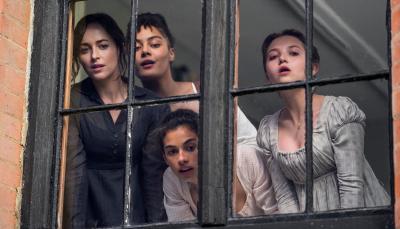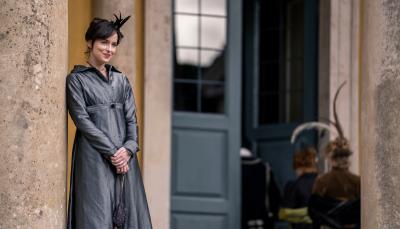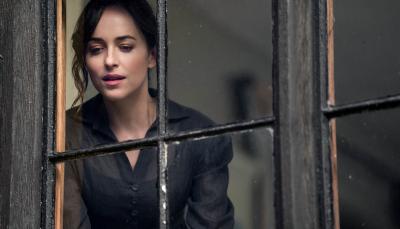Classics Revisited: Why the 1995 'Persuasion' is a Perfect Jane Austen Adaptation
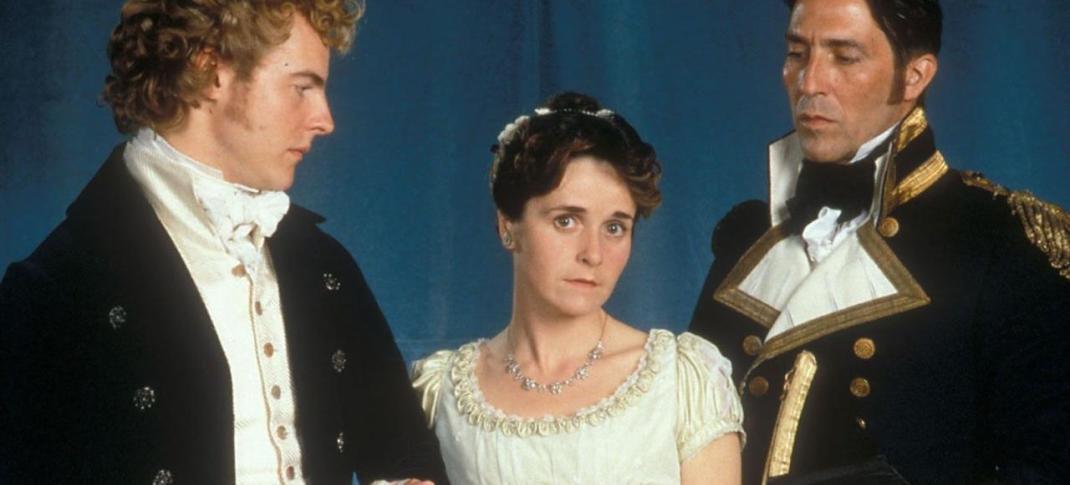
You pierce my soul. I am half agony, half hope. Tell me not that I am too late, that such precious feelings are gone forever. I offer myself to you again with a heart even more your own than when you almost broke it eight years and a half ago. Dare not say that man forgets sooner than woman, that his love has an earlier death. I have loved none but you.
If Persuasion has been described (not altogether accurately) as a "Cinderella" story, the 1995 film adaptation is the Cinderella of Jane Austen adaptations. It was a big year for Austen, with Andrew Davies' Pride and Prejudice and Emma Thompson's Sense and Sensibility. Persuasion, however, was a low-budget BBC endeavor adapting Austen's 1817 novel in under two hours. There was such a demand for Austen-era costumes, designer Alexandra Byrne (Emma) had to turn to suppliers in Italy and Australia. Thankfully, BBC's collaboration with Masterpiece and Sony Pictures Classic (which put it out in limited release) led to extra funding, allowing filming on location and borrowed footage of tall ships from 1984's The Bounty.
The screenplay was by Nick Dear with Roger Michell directing and starred newcomer Amanda Root as Anne Elliot. However, thjey discovered the book presented problems, as the central character hardly speaks for most of the first half, making it hard to move the action along. But the director's goal was for it to feel genuine, like it could be happening in the next room, instead of getting caught up in the period details. U.S. critics had mixed feelings about the film. In The New Yorker, Anthony Lane called it "troubled, astringent, and touched with melancholy" — not unlike the novel. And The Chicago Tribune commented, "the dress and makeup [are] far plainer and probably more truthful than we're accustomed to in Masterpiece Theatre productions."
As for some viewers, they complained that the leads were ugly. Not so. Ciarán Hinds looks like a rugged, handsome, weatherbeaten man who's spent most of his adult life at war. Root starts off wan and downbeaten but comes into her own. In the familiar, glamorous city of Bath, you'll see a beggar wearing the remnants of a Navy uniform, a veteran of the Napoleonic wars. There's a lot of informality. Women hoist skirts to warm their feet and legs at the fireside; men's coats are discarded indoors, and everyone puts their elbows on the table. If you went for a walk in this version, you'd get cold, muddy, and wet. It looks absolutely right.
The film begins with an Admiral (who we'll meet again) leaving his ship. It's 1814; the Napoleonic Wars have ended as we visit Kellynch Hall, the home of our heroine, Anne Elliot. She is in her late twenties and regretting her decision not to marry Frederic Wentworth (Ciarán Hinds) eight years previous. Her mother had died some years before, leaving her with Lady Russell (Susan Fleetwood) as her mentor. Lady Russell advised her as Wentworth was on active duty and had no money, they should not get engaged. The rest of the family dinged this into Anne's head with (we can assume) a great deal of malice.
Sir Walter Elliot (Corin Redgrave) is a vain and idiotic spendthrift, aided and abetted by his eldest daughter Elizabeth (Phoebe Nicholls). His lawyer advises him to rent the house out and move to Bath to live elegantly and within his means, and he rises to the bait of being a big fish in a small sea. Along with moving, he is also convinced to take Mrs. Clay (Felicity Dean), his lawyer's widowed daughter, who is appropriately obsequious.
And Anne? Well, she is of no consequence, having missed her chance at marriage and then subsequently turning down Charles Musgrove Jr. (Simon Russell Beale), who turned around and married her younger sister Mary (Sophie Thompson). But she is the one who gets things done, supervising the preparation of the house for the tenants. She is also the only one troubled by who will live at Kellynch Hall: Admiral Croft (John Woodbine) and Mrs. Croft (Fiona Shaw), Frederick Wentworth's sister. It's a small world.
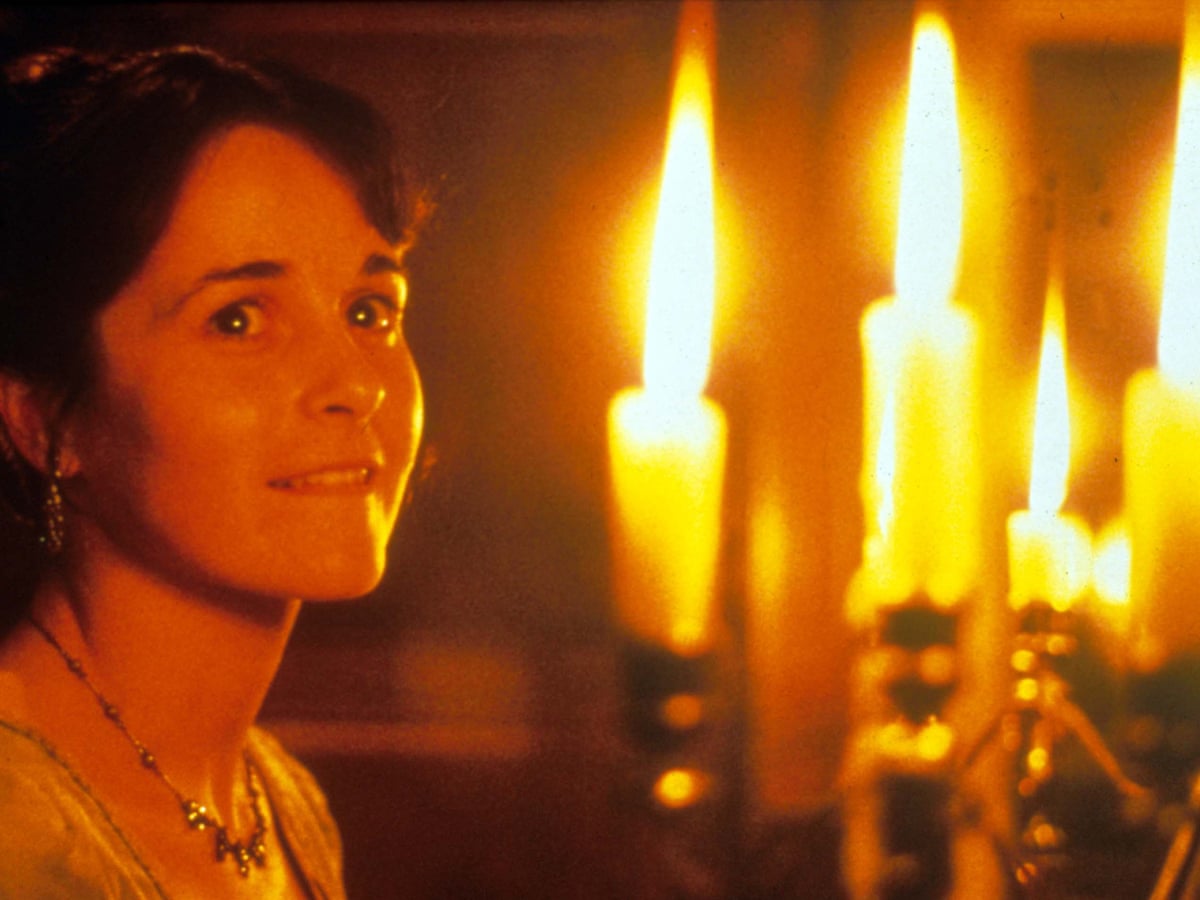
The Musgroves adore Anne; Charles is very aware he married the wrong sister, and he, his sisters, and his mother all confide in her, one after the other, to complain about Mary — her health complaints, her parenting style, her bad manners, and so on. And, worse yet, they have a visitor, Captain Frederick Wentworth, handsome, glamorous, and rich from prize money. The Musgroves are all crazy about him — even Charles has a bit of a mancrush — and his sister Louisa (Emma Roberts) flirts for England with him. Wentworth is all too willing to flirt back. As he tells his sister, mostly in jest, "Yes, here I am, Sophia, quite ready to make a foolish match. Anybody between fifteen and thirty may have me for asking."
The Crofts, by the way, are the most delightful, likable couple you'll ever meet in Austen, and Mrs. Croft is an object of admiration for sailing with her husband. Wentworth claims never to have women aboard, but Sophia sets him straight with these famous lines:
I hate to hear you talk about all women as if they were fine ladies instead of rational creatures. None of us want to be in calm waters all our lives.
And all the while, Anne realizes what she's missed. It's heartbreaking. Worse, Mary tells her, "Captain Wentworth is not very gallant by you, Anne, though he was so attentive to me. Henrietta asked him what he thought of you, when they went away, and he said, "You were so altered he should not have known you again." Ouch. Anyway, the gang — Louisa, her sister Henrietta (Victoria Hamilton), and Charles and Mary, accompany Wentworth to visit his naval officer friend Captain Harville (Robert Glenister). Anne goes too, but the change of scene, the excitement of being by the sea, make it less awkward than you'd think. Away from her dreadful family, Amanda Root somehow achieves Anne's transformation without makeup.
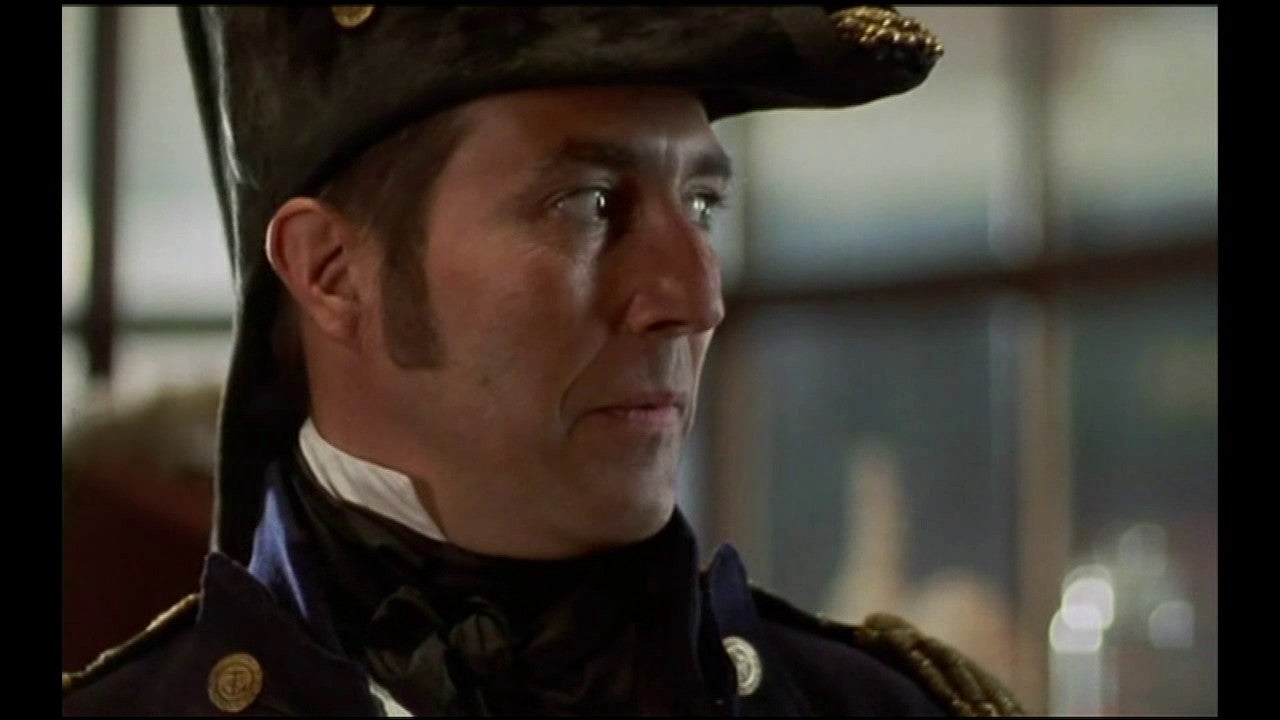
Let us pause to appreciate the best Austen hero ever, Wentworth. He's the personification of Austen's love and admiration for the Navy and its officers. (Two of her brothers were Navy men.) The Navy was one of few professions where one could rise in the ranks on your own merit. (Probably why Sir Walter doesn't like naval men.) In a brief scene on the beach at Lyme, Wentworth stares out to sea, obviously longing to get back into action again. He's energetic, masculine, and, oh, fill in the blanks. Also, significantly, he's started to notice Anne when Henrietta mentions Charles initially wanted to marry Anne but was turned down.
Anne bonds with Wentworth's friend Captain Benwick (Richard McCabe), whose fiancé, Harville's sister, died when he was at sea. He takes solace in poetry, which Anne also likes, and they sweely recite verses together. Although Anne, alarmed at his depth of feeling, suggests he might try reading prose. Wentworth can't help but notice their ease with each other. But it's when Mr. Elliot (Samuel West), the estranged heir to Kellynch with rumors of money problems, encounters Anne at the inn and gazes on her with great interest when the jealousy really kicks in. As Wentworth watches random males buzz around Anne like wasps around a jam pot, he realizes what he's missed.
Meanwhile, Louisa is still flirting with Wentworth. On a walk on Lyme's famous Cobb, the party totter down steep steps, and Louisa insists on jumping so Wentworth can catch her. Like a toddler, she wants to do it again, but he isn't there this time. It's a fantastic bit of filming: Louisa launches herself into the air against a blue sky as a skylark sings, and there's a flutter of fabric, all in slow motion. When she lands, all hell breaks loose. Tough Navy men panic and flap around helplessly as Anne takes charge. Severely injured, Louisa is carried back. Mary insists on staying, so Wentworth drives Henrietta and Anne to break the news about Louisa to her family. Notably, he recognizes Anne's level-headedness and sense. Now, he's really seeing her.
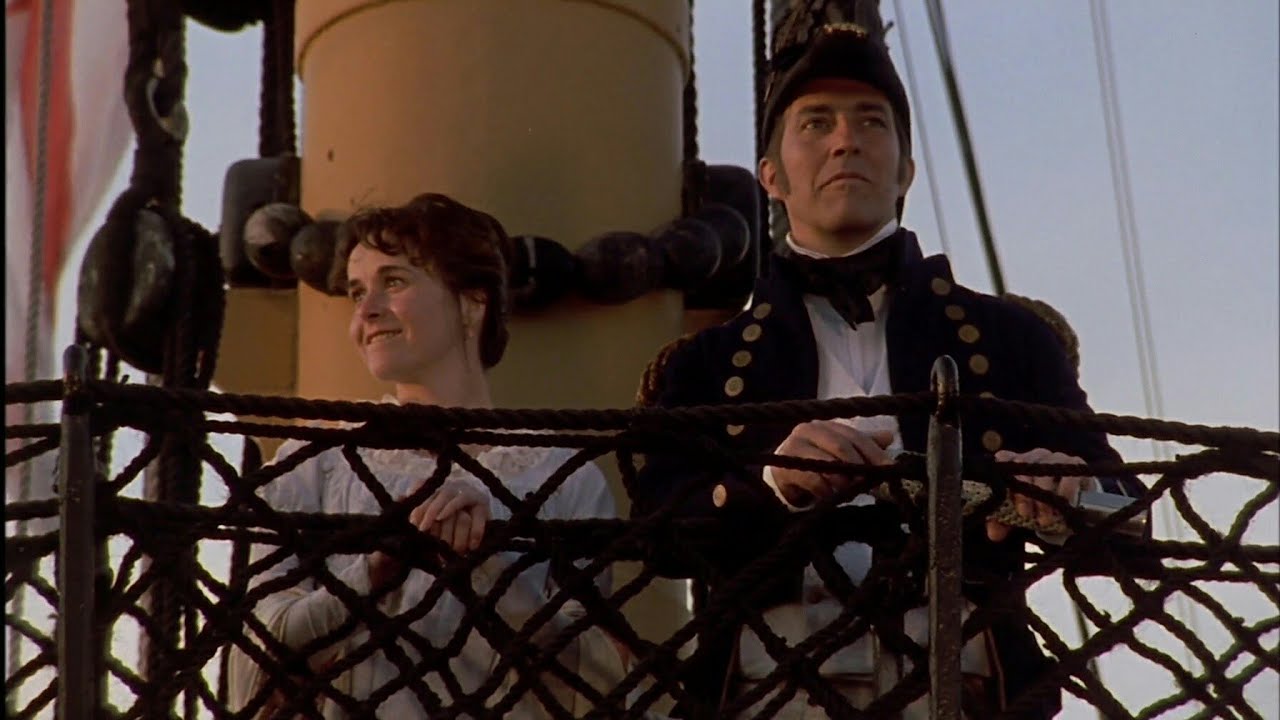
But Anne has to rejoin the rest of her family. To her surprise, Mr. Elliot is there, the rift with the family magically healed. Sir Walter approves, and Mr. Elliot seems to be seriously pursuing Anne, but her instincts tell her not to respond. Naturally, Wentworth arrives in Bath; the Musgroves and the Crofts eventually turn up too. Louisa has recovered, but she's a changed woman, a serious reader of poetry, attracting Captain Benwick, and is now engaged to him. Mr. Elliot flirts with Anne, adeptly separating her and Wentworth in various locations. Wentworth starts feeling Anne is complicit, and he is too late. Anne begs him to stay at a concert they all attend, but he will not. Ironically, Wentworth is no strategist on dry land and in love.
Anne discovers an old friend, Mrs. Smith (Helen Schlesinger), has come to take in the waters. Her father is affronted she's meeting a commoner when she could be hobnobbing with high society. But Anne defies him and lucks into the truth about Mr. Elliot, when Mrs. Smith reveals he's double-dealing. He plans to marry Anne and then reveal Mrs. Clay is his mistress, so Sir Walter will not marry her, thus avoiding disinheritance. Mr. Elliot is also the reason Mrs. Smith ended up in desperate poverty. Back at the Musgroves, Anne and Harville talk about Benwick's choice of a bride. Harville is disappointed, feeling Louisa does not measure up to his late sister.
Harville says: "I do not think I ever opened a book in my life which had not something to say upon woman's inconstancy. Songs and proverbs all talk of woman's fickleness." All written by men, Anne says. (It's Harville's dialogue in the book, but it has so much more impact coming from her.) "All the privilege I claim for my own sex (it is not a very enviable one: you need not covet it) is that of loving longest when existence or when hope is gone!" Soon after, Wentworth returns for his umbrella and indicates a letter under the blotter to Anne that he wrote while listening to them talk. There's then an astonishing dive into Fellini-land with the arrival of a circus parade, and under cover of the commotion and excitement, they kiss for the first time.
Despite staying pretty faithful to the book, the film ends with an invented scene where Anne walks through the candlelit room saying goodbye to her family and their way of life and turns down Mr. Elliot's offer of marriage. Wentworth strides into the room and tells Sir Walter he has come to ask for Anne's hand. Swoon. As a post-script to the story, there's a brief scene (using the HMS Victory, Nelson's flagship) explaining Napoleon escaped from the island of Elba to France in March of 1815. Following Sophia Croft's example, Anne accompanies her husband to war.
Persuasion is still difficult to track down; at the moment, you can find it for rent or purchase on Amazon Prime or YouTube, but it's well worth the effort. Have you seen this adaptation? What did you think of it? Let's discuss!


